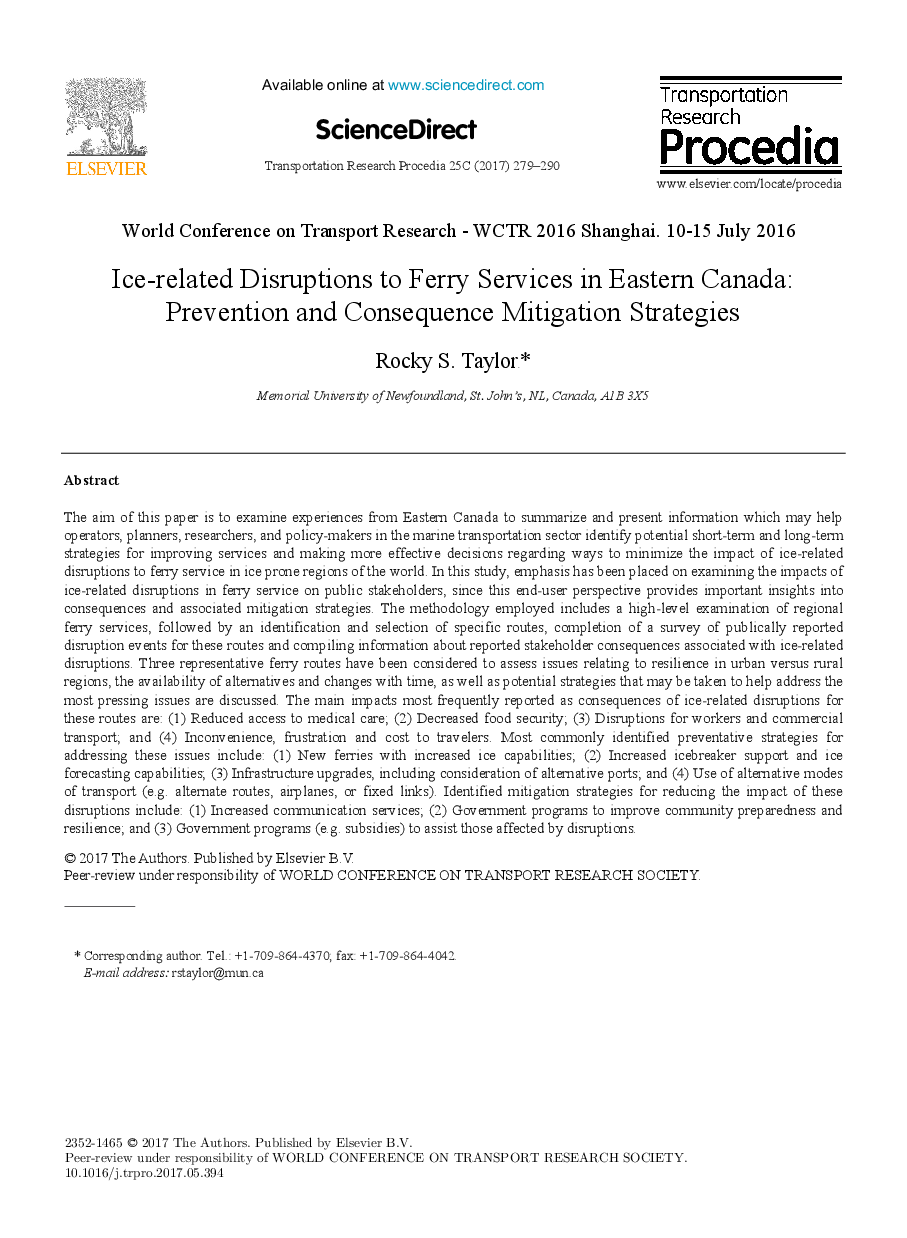ترجمه فارسی عنوان مقاله
اختلالات یخ مربوط به خدمات فری در کانتی های شرقی: راهکارهای کاهش پیشگیری و پیامدهای آن
عنوان انگلیسی
Ice-related Disruptions to Ferry Services in Eastern Canada: Prevention and Consequence Mitigation Strategies
| کد مقاله | سال انتشار | تعداد صفحات مقاله انگلیسی |
|---|---|---|
| 98507 | 2017 | 12 صفحه PDF |
منبع

Publisher : Elsevier - Science Direct (الزویر - ساینس دایرکت)
Journal : Transportation Research Procedia, Volume 25, 2017, Pages 279-290
ترجمه کلمات کلیدی
حمل و نقل در آب های یخ تحت پوشش، اختلالات عملیاتی، پیشگیری و کاهش خطر، دیدگاه ذینفع،
کلمات کلیدی انگلیسی
Transportation in Ice Covered Waters; Operational Disruptions; Risk Prevention and Mitigation; Stakeholder Perspective;
ترجمه چکیده
هدف از این مقاله بررسی تجربیات کانادای شرقی برای خلاصه کردن و ارائه اطلاعات است که ممکن است به اپراتورها، برنامه ریزان، محققان و سیاست گذاران در بخش حمل و نقل دریایی کمک کند تا راهکارهای کوتاه مدت و بلند مدت برای بهبود خدمات و ساخت تصمیمات موثرتر در مورد راه هایی برای به حداقل رساندن تاثیر اختلالات مرتبط با یخ به خدمات کشتی در مناطق یخ در جهان. در این مطالعه، تأکید بر تأثیرات اختلالات مرتبط با یخ در خدمات کشتی در ذینفعان عمومی تأکید شده است، زیرا این نگرش نهایی کاربر، دیدگاه های مهم در مورد عواقب و استراتژی های کاهش ریسک را ارائه می دهد. این روش شامل موارد زیر است: بررسی معیارهای خدمات کشتی های منطقه ای، شناسایی و انتخاب مسیرهای خاص، تکمیل نظرسنجی از رویدادهای ناشی از وقفه های گزارش شده در این مسیرها و جمع آوری اطلاعات مربوط به نتایج مربوط به ذینفعان مربوط به اختلالات مربوط به یخ. سه مسیر نمایندگی کشتی برای ارزیابی مسائل مربوط به انعطاف پذیری در مناطق شهری و روستایی، در دسترس بودن جایگزین ها و تغییرات در زمان، و نیز راهبردهای بالقوه ای که ممکن است برای کمک به حل مسئله ی مهم ترین مسائل مورد بحث قرار گیرد، درنظر گرفته شده است. اثرات اصلی اغلب به عنوان پیامدهای ناشی از اختلالات مرتبط با یخ برای این مسیرها گزارش شده است: (1) دسترسی به مراقبت های پزشکی کم شده؛ (2) کاهش امنیت غذایی؛ (3) اختلال کارگران و حمل و نقل تجاری؛ و (4) ناراحتی، سرخوردگی و هزینه مسافران. اغلب راهبردهای پیشگیرانه شناسایی شده برای رسیدگی به این مسائل عبارتند از: (1) کشتی های جدید با قابلیت افزایش یخ؛ (2) افزایش پشتیبانی یخچال و قابلیت پیش بینی یخ؛ (3) ارتقاء زیرساخت ها، از جمله در نظر گرفتن پورت های جایگزین؛ و (4) استفاده از روش های جایگزین حمل و نقل (به عنوان مثال مسیرهای متناوب، هواپیماها، یا لینک های ثابت). استراتژی های کاهش یافته شناسایی شده برای کاهش تاثیر این اختلالات عبارتند از: (1) افزایش خدمات ارتباطی؛ (2) برنامه های دولت برای بهبود آمادگی جامعه و انعطاف پذیری؛ و (3) برنامه های دولتی (مثلا یارانه ها) برای کمک به کسانی که تحت تاثیر اختلالات قرار دارند.

